
Enthymema-International Journal of Literary Criticism Literary Theory and Philosophy of Literature
Scope & Guideline
Exploring the Depths of Literary Thought
Introduction
Aims and Scopes
- Literary Theory and Criticism:
The journal emphasizes literary theory, engaging with various schools of thought such as psychoanalysis, structuralism, postmodernism, and feminist theory to analyze texts and their cultural implications. - Philosophy of Literature:
It explores philosophical inquiries into literature, including the nature of narrative, the role of aesthetics, and the ethics of representation, thereby bridging literary studies with philosophical discourse. - Interdisciplinary Approaches:
The journal promotes interdisciplinary research that intersects literature with fields such as cognitive science, cultural studies, and digital humanities, reflecting contemporary academic trends. - Historical Contextualization:
A consistent focus on the historical context of literary works allows for a deeper understanding of texts within their socio-political and cultural frameworks. - Exploration of Non-Western Literatures:
The journal includes studies of non-Western literary traditions and their interactions with Western paradigms, fostering a more global perspective in literary studies.
Trending and Emerging
- Neurocognitive Approaches:
There is a growing interest in neurocognitive literary studies, exploring how cognitive processes influence the creation and interpretation of literature, as seen in works like 'Neurocomputational Poetics'. - Digital Literature and Media:
The intersection of literature and digital media is increasingly prominent, with discussions around transmedia storytelling, online narratives, and the impact of social media on literary forms. - Environmental and Ecocritical Perspectives:
Emerging themes in ecocriticism reflect a heightened awareness of ecological issues within literary contexts, as seen in analyses of texts that engage with environmental concerns. - Gender and Identity Studies:
The journal is witnessing an uptick in research focusing on gender, sexuality, and identity, particularly through the lens of contemporary issues in literature and society. - Narrative and Conspiracy Theories:
An intriguing trend is the exploration of narrative structures in the context of conspiracy theories, reflecting societal anxieties and the complexities of truth in contemporary discourse.
Declining or Waning
- Traditional Canonical Texts:
There has been a noticeable decline in analyses focused solely on canonical Western literary texts, as the journal increasingly prioritizes diverse voices and contemporary works. - Purely Theoretical Discourse:
The journal seems to be moving away from abstract theoretical discussions that lack practical application, favoring analyses that connect theory with real-world implications and cultural contexts. - Static Historical Narratives:
Research that presents static or uncritical historical narratives is becoming less prominent, as the journal embraces more dynamic and critical approaches to history in literature.
Similar Journals

CLIO-A JOURNAL OF LITERATURE HISTORY AND THE PHILOSOPHY OF HISTORY
Challenging Boundaries in Literature and Historical ThoughtCLIO: A Journal of Literature, History, and the Philosophy of History, published by Indiana University-Purdue University, serves as a pivotal platform for scholars and students alike. Since its inception, this journal has offered a unique convergence of literary analysis, historical context, and philosophical inquiry, creating a rich dialogue across disciplines. With an ISSN of 0884-2043, CLIO has evolved alongside the academic landscape from its early days in the late 20th century, reflecting the changing paradigms of literature, history, and philosophical thought. Although currently categorized in the Q4 quartile across its three relevant fields—History, Literature and Literary Theory, and Philosophy—it continues to invite contributions that challenge traditional boundaries and foster interdisciplinary research. While not currently an Open Access journal, CLIO remains an essential resource for those invested in the critical exploration of historical narratives and literary expressions, appealing to all who seek to understand the intricate weave between past and present.

Ermeneutica Letteraria-Rivista Internazionale
Advancing Critical Perspectives on Literature and LinguisticsErmeneutica Letteraria-Rivista Internazionale, published by FABRIZIO SERRA EDITORE, serves as a notable platform for the ongoing discourse in the fields of Arts and Humanities, Linguistics, Literature, and Literary Theory. Since its inception in 2019, this scholarly journal has become a significant reference point for innovative research while critically engaging with various literary paradigms and linguistic phenomena. Although currently classified in the Q4 quartile across its respective categories by Scopus, its commitment to open discourse invites submissions that challenge existing norms and broaden the horizons of contemporary literary critique. The journal's holistic approach not only supports the scholarly community in Italy but also aims to foster international dialogue among researchers, professionals, and students in the humanities. The journal is located in Pisa, Italy, and due to its open access policy, it seeks to ensure that knowledge is accessible to a wider audience while contributing to the collective understanding of literary interpretations and linguistic developments.

Estudios de Teoria Literaria-Revista Digital-Artes Letras Humanidades
Shaping the Future of Literary ScholarshipEstudios de Teoria Literaria-Revista Digital-Artes Letras Humanidades is a prominent scholarly journal published by UNIV NAC MAR PLATA in Argentina, dedicated to advancing the fields of Literary Theory, Communication, and Cultural Studies. Established with an Open Access model since 2012, the journal fosters global dissemination of research without financial barriers, encouraging a broader dialogue among scholars, practitioners, and students alike. Notably, it enjoys a presence in Scopus, with various category quartiles indicating its commitment to quality and relevance, particularly with rankings such as Q3 in Literature and Literary Theory. By providing a platform for innovative scholarship, Estudios de Teoria Literaria aims to explore complex theoretical frameworks and cultural discourses, making significant contributions to ongoing debates in the humanities. The journal is published from its base in Mar del Plata, Buenos Aires, and continues to expand its influence in both regional and international academic communities.
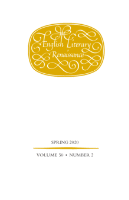
ENGLISH LITERARY RENAISSANCE
Connecting Scholars through Rigorous ResearchENGLISH LITERARY RENAISSANCE, published by University of Chicago Press, stands as a pivotal academic journal in the realm of Literature and Literary Theory. With a historical pedigree dating back to 1971, this esteemed journal has made significant contributions to the study of English literature, exploring a wide array of themes, methodologies, and critical interpretations that underscore the richness of literary discourse. The journal is ranked in the Q2 category for literature and literary theory and is positioned in the 89th percentile in the Scopus rankings, affirming its impact within the field. Although it does not operate under an open access model, ENGLISH LITERARY RENAISSANCE continues to attract a vibrant community of scholars and educators eager to engage with its rigorous scholarship and innovative approaches. This journal not only serves as a platform for groundbreaking research but also fosters critical dialogue that shapes the future of literary studies.
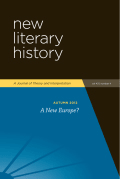
NEW LITERARY HISTORY
Unveiling New Perspectives in Literary ScholarshipNEW LITERARY HISTORY is a premier journal in the field of Literature and Literary Theory, published by Johns Hopkins University Press. With an impact factor that places it in the prestigious Q1 quartile of academic publishing, this journal stands out as a leading voice in literary scholarship. Since its inception in 1983 and through its convergence years until 2024, NEW LITERARY HISTORY has been at the forefront of critical debates, offering innovative theoretical frameworks and historical perspectives on literary studies. The journal is indexed in Scopus, ranking in the top 3% of literature publications globally (Rank #28/1106), making it an essential resource for researchers, professionals, and students alike. Although it operates under a traditional access model, the unparalleled quality of its content ensures that it remains a vital platform for disseminating cutting-edge research and fostering intellectual dialogue within the humanities. Explore the rich and dynamic world of literary theory through NEW LITERARY HISTORY and contribute to the ongoing exploration of literature's impact on culture and society.
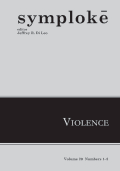
Symploke
Fostering Dialogue Across DisciplinesSymploke, published by University of Nebraska Press, is a leading interdisciplinary journal in the fields of literary and cultural studies that aims to foster dialogues across a diverse range of scholarly perspectives. With its ISSN 1069-0697 and E-ISSN 1534-0627, the journal is committed to publishing high-quality research that examines the intersections of literature, philosophy, and social theory. As a prominent platform for innovative scholarship, Symploke plays a crucial role in advancing critical discourse, making it an essential resource for researchers, professionals, and students alike. The journal provides unrestricted access to its valuable content, thereby ensuring the dissemination of knowledge without barriers. With an emphasis on in-depth analyses and theoretical contributions, Symploke continually seeks to expand the horizons of contemporary thought and offers a vital forum for voices within the academic community.
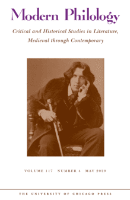
MODERN PHILOLOGY
Engaging Scholars in the Art of Language and LiteratureMODERN PHILOLOGY is a distinguished academic journal published by the University of Chicago Press, dedicated to the exploration and advancement of knowledge in the fields of cultural studies, linguistics, and literary theory. Having commenced its publication in 1905, the journal continues to foster scholarly discourse and innovation through rigorous research and critical analysis, making it a vital resource for researchers, professionals, and students alike. With an ISSN of 0026-8232 and a commendable Scopus ranking, including a 69th percentile in Literature and Literary Theory, MODERN PHILOLOGY occupies a significant position within its respective quartiles (Q4) in the 2023 assessments. Although the journal does not currently offer open access, it remains a crucial platform for contributions that interrogate the complexities of language and literature. As a leading publication in its field, MODERN PHILOLOGY invites submissions that challenge conventional paradigms, encouraging a fresh examination of texts, contexts, and cultural phenomena from 1996 through 2024 and beyond.

ItinerArios-Revista de Literatura
Illuminating the Depths of Literary DiscourseItinerArios-Revista de Literatura is a distinguished academic journal published by Universidade Estadual Paulista (UNESP), located in the vibrant city of Araraquara, Brazil. With a commitment to exploring the depths of literary analysis and theory, this journal serves as a crucial platform for scholars, researchers, and students to disseminate their work in the field of literature. Though the journal does not currently offer open access, it boasts a comprehensive focus on various literary traditions, critical interpretations, and emerging trends within the literary landscape. The ISSN for the print edition is 0103-815X, ensuring its recognition in the academic community. By providing a valuable forum for innovative research and engaging discussions, ItinerArios plays an essential role in enriching the discourse in the realm of literary studies, appealing to professionals and enthusiasts alike who are eager to contribute to and engage with contemporary literary scholarship.
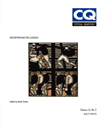
CRITICAL QUARTERLY
Connecting scholars through rigorous analysis and diverse perspectives.CRITICAL QUARTERLY, published by Wiley, is a distinguished journal that has been at the forefront of critical discourse since its inception in 1959. With an ISSN of 0011-1562 and an E-ISSN of 1467-8705, it serves as a vital resource in the fields of Cultural Studies and Literature and Literary Theory, demonstrating a commendable influence as evidenced by its placement in Q3 and Q2 quartiles respectively. The journal's impact factor, while not explicitly listed, is inferred from its reputable standing, with Scopus rankings placing it within the 54th and 29th percentiles in its respective categories. By offering a platform for rigorous analysis and diverse theoretical perspectives, CRITICAL QUARTERLY aims to foster scholarly dialogue and advance the study of literature and culture. Situated in the United States, the journal's commitment to academic excellence makes it an invaluable asset for researchers, professionals, and students dedicated to the exploration of critical theory and cultural critique.
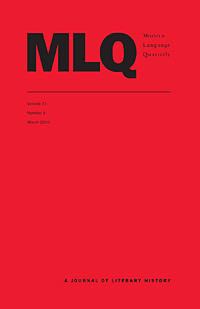
MODERN LANGUAGE QUARTERLY
Cultivating a Vibrant Forum for Innovative Research.MODERN LANGUAGE QUARTERLY, published by DUKE UNIVERSITY PRESS, stands as a premier journal in the field of Literature and Literary Theory, recognized for its intellectual rigor and scholarly contributions. With an impressive Scopus ranking of #156 out of 1106 in its category, the journal showcases an 85th percentile standing, indicating its significant impact within the academic community. The journal, with ISSN 0026-7929, focuses on critical analysis, literary theory, and the intersection of language and culture, making it an essential resource for researchers, professionals, and graduate students alike. As it converges from 1996 to 2024, MODERN LANGUAGE QUARTERLY continues to uphold its tradition of excellence in literary scholarship, contributing to the advancement of knowledge and fostering a deeper understanding of literature's role in society. With its Q1 ranking in 2023, this journal represents the forefront of literary studies, providing a vibrant forum for the exchange of ideas and innovative research in the humanities.